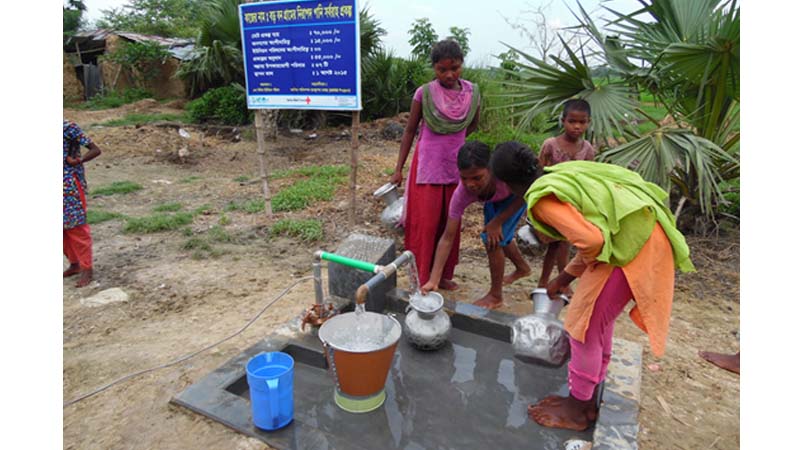Submersible pumps, a blessing for Barind people


Submersible pumps have brought boon for the people of drought-prone Barind area here, supplying safe drinking water to over 2.80 lakh marginalized people including 68,000 ethnic minority ones, reports BSS.
Apart from this, more eight lakh people in 38 Union Parishads (UPs) and three pourasabhas in Rajshahi, Naogaon and Chapainawabganj districts are also being benefited by it.
DASCOH Foundation and Swiss Red Cross jointly run these pumps under its‘Integrated Water Resource Management (IWRM)’ project with around Tk 3.50 crore financial supports from Swiss Agency for Development and Cooperation-SDC.
In order to ensuring safe drinking water for Barind under-privileged people, 344 submersible pumps and 44,228 feet sub-surface pipelines have, so far, been installed in 312 drought-hit villages since July, 2015.
Five solar panels were also established to operate five pumps in the villages still being remained beyond power network.
Around 5,400 inhabitants of 1,200 households have been possible to be reached water at their door-steps due to installation of a deep tube-well, a 35,000-liter capacity overhead tank and 6,000-meter pipelines at Bidirpur village under Godagari Upazila.
“We have set a target to bring a total of 12.58 lakh people under the safe drinking water supply coverage by June, 2022,” Jahangir Alam Khan, Assistant Coordinator of IWRM Project told BSS here on Tuesday.
He said the initiative has been taken to supply safe drinking water to the poor and vulnerable villagers’ round-the-year.
“We are very much happy after getting safe drinking water,” said Amrita Kisku, 42, wife of Shital Kisku of Uchadanga village under Tanore upazila in the district.
Anila Kisku, 38, wife of Sunil Kisku of the same village, also expressed her happiness over the water supply system. She is now getting requisite water for her nine-member family.
Lutfor Rashid Haider, Chairman of Tanore Upazila, said the poor and underprivileged people in the drought-hit area are getting safe drinking water for the IWRM Project.
In the wake of inadequate aquifer recharge, groundwater level is declining alarmingly in the high Barind tract, posing a serious threat to its farming sector besides living and livelihood conditions of local people, he said.
Lifting underground water through deep tube-wells is becoming tougher during the dry season day by day while options for surface water are also very limited, he added.
He, however, said that the submersible water supply system has become a blessing for the drought-affected people.
Akramul Haque, Chief Executive Officer of DASCOH Foundation, said the scheme aims to increase the availability of water for disadvantaged people in the Barind areas and protect them from health risks related to use of unsafe water.
Prof Chowdhury Sarwar Jahan of Department of Geology and Mining in Rajshahi University referred to various research findings, saying there is a shortage of drinking water in the region during dry season and the problem has become acute for the last couple of years.



